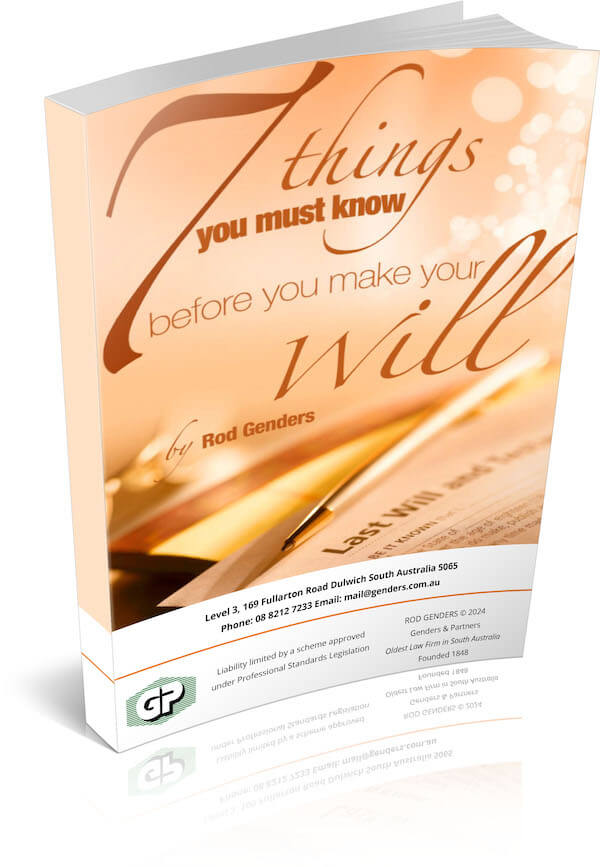
You may have thought the hardest decisions associated with formalising your relationship related to organising the party and keeping uncle Fred away from cousin Merle, but here are a few other considerations…
Change of Name
Traditionally, when a woman married, she took the last name of her husband.
However this is not as common as it once was, and there is no legal compulsion to do so.
With same-sex marriage now legally available, there is often not the same desire to prioritise one family name over another. Still it is an option available for consideration.
In South Australia you don’t need to register your new name with Consumer and Business Services (CBS) if you get married in Australia and take your partner’s surname, or decide to go back to your surname before marriage.
If you were married overseas and want to take on your partner’s surname, you should contact the relevant authority or business, such as your bank or the Australian Passport Office to see what evidence you need to give them.
To change your name on documents such as your passport or driver’s licence, you must do so directly with the relevant authority, such as Service SA or the Australian Passport Office.
They’ll tell you what evidence you need to give them.
Once you have formalised your name-change, then you will need to register your new name on all your accounts and subscriptions, including Centrelink, Medicare the Australian Taxation Office, banks, utility providers etc.
Change of Address
Similar to change of name, it is common for a change in relationship status to coincide with a move to a new home.
Make sure that you update your new address on all your accounts and subscriptions, including Centrelink, Medicare the Australian Taxation Office, banks, utility providers etc.
Joint Ownership of Assets
Do you want to combine your daily operating bank accounts to a single joint account?
You and your new spouse may wish to acquire assets together. There is nothing wrong with owning property jointly, but you may wish to pause and consider whether it is the most tax efficient or protective way to own your assets.
For example, if your new spouse owns and operates their own business, you may wish to protect your financial interests from the risk of third-party claims made against your spouse, such as claims made by creditors and predators, a trustee in bankruptcy, injured employees or disgruntled clients.
Further, depending on your situation, there may be asset protection options and tax efficiencies to be gained from owning assets in trusts.
Registering De Facto / Domestic Partnership
While de facto / domestic partner couples may be able to assert some of the same rights as married couples, they often have to expend significant time, money and unnecessary heartache to do so.
Marriage allows people to access a complete package of rights simply by showing their marriage certificate or ticking a box, and is based on their mutual promises to one another rather than proving their relationship meets particular interdependency criteria.
Unlike de facto / domestic partner relationships, marriage is recognised nationally and internationally.
In Australia there has been an increasing number of people who do not see marriage as the final step. Instead, they would prefer to live with each other outside of the boundaries of marriage. This is called a de facto relationship.
Simply defined, a de facto relationship is a couple living together (including same-sex), who are not married or related to one another.
If a court was to determine if a couple are in a de facto relationship, it would look at:
- the duration of the relationship;
- the nature of the common residence;
- if it was a sexual relationship or not;
- the extent of financial dependence or interdependence; and
- the ownership of property.
On the other hand, a domestic relationship does not require a sexual component to the relationship.
All that is required is that there be a close personal bond between the two adults living together.
A domestic relationship is defined by the domestic and personal care provided by both or one of the adults.
You can have more than one domestic partner at a time. The participants may or may not be related.
The laws regarding de facto / domestic couples differ between states and the commonwealth, and from one right to another.

For Centrelink purposes, you are a de facto couple from the moment you start living together; for migration law it is after 12 months of cohabiting (unless you have a child together or de facto relationships are illegal in your country of origin).
Under family law it is different again: a minimum of two years (unless you have a child together, have registered your relationship, or have made significant contributions to the relationship).
De facto relationship property disputes and claims for spousal maintenance are covered by the Family Law Act 1975 (Cth). Prior to 1 July 2010, South Australian law covered these disputes.
In some cases, there may be doubt about whether the old State law still applies, or whether the Family Law Act 1975 (Cth) applies.
Where married couples use IVF, both spouses are automatically legal parents. But for de facto couples using reproductive technologies, their child’s parentage depends on whether a de facto relationship is proven to exist.
Couples who are or were married must file for property and/or spousal maintenance proceedings in the family court within one year of finalising a divorce, but have the option to agree to an extension of time in which to file.
No such provision exists for de facto couples; they must file proceedings within two years.
In most Australian states, a new marriage nullifies an existing Will, unless that Will is very specifically worded. This is not the case when you enter a new de facto relationship.
In the latter situation, if you die before making a new Will, a court might need to decide how your assets are allocated (with costs borne by your estate).
In all contexts, de facto relationships require significant proof, which means partners may have to provide evidence about their living and childcare arrangements, sexual relationship, finances, ownership of property, commitment to a shared life and how they present as a couple in public.
In South Australia registering your de facto or domestic partner relationship with Consumer and Business Services (CBS) means that your relationship is legally recognised.
It can make it easier to access entitlements and assert your rights, including in medical situations. Registering your relationship is not the same as getting married.
You can register your relationship if you are 18 years of age or older and in a relationship with another person as a couple.
At least one of you must live in South Australia. Couples may apply irrespective of their sex or gender identity.
Your relationship can’t be registered if you or your partner are:
- married
- already in a registered relationship or corresponding law registered relationship
- in a relationship as a couple with another person
- related by family.
Binding Financial Agreement
There is no doubt that asking your new partner/spouse to sign a Binding Financial Agreement (BFA) or ‘pre-nup’ is not going to be an easy conversation, but in many situations a marriage doesn’t just involve the two people exchanging vows.
The protection offered by a good BFA is usually as much for other peoples’ benefit, as it is for the couple.
Putting in writing what will happen to your property if your relationship breaks down is very useful when:
- One partner has inherited or will inherit significant wealth, and want or need to protect that inheritance for their side of the family;
- One partner has one or more children from a previous relationship who need financial protection;
- One partner is in a business partnership with other people; or
- One partner co-owns or works on a family farm or in a family business.
You, your children, business partners and parents will feel much more relaxed about your marriage if they know whatever the outcome of your relationship, that their financial security is not going to be compromised.
Loan from Parents
The ‘Bank of Mum and Dad’ may have offered to come to your assistance to purchase your new marital home.
This assistance can take the form of either a ‘gift’ or a ‘loan’, and you need to be crystal clear about what it is.
A loan must be repaid, a gift does not. Make sure you understand what Mum and Dad intend, and put it in writing!
When your parents die, you don’t want to be arguing with your siblings about whether the money was a gift, or if it was a loan that must be paid back to their estate and shared, or whether interest is owed by you to the estate.
Just as important, if your relationship/marriage doesn’t work out, you don’t want your parents to lose their money to your ex-spouse/partner.
Wills

Marriage changes everything where inheritance is concerned.
If you have already made a Will, your marriage cancels it – even if you don’t want it to.
The only exception is if your Will has been made ‘in anticipation of your marriage’ and this intention needs to be expressly (and very carefully) worded in your Will.
If you don’t make a Will, you can’t be sure your assets will end up where you intended when you die. Most people wrongly think that their assets will ‘just go to their spouse’, or ‘go to their kids’. But this is not the case.
If, you don’t have a Will, then the laws of ‘intestacy’ apply (i.e. dying without a Will), and these laws vary from time to time and from place to place – that is, the outcomes are different in each State, and what happens to your assets on your death varies depending on the laws where you live.
For example, if you have a spouse and children with that spouse, in South Australia, the first $100,000 plus half of the remaining assets automatically go to your spouse.
The balance of the estate is then divided equally between your children, whereas in New South Wales your entire estate passes to your spouse. Making a Will that takes into consideration your changed circumstances is therefore critical.
One legal advantage of marriage is that the spouse is automatically known and recognised at law. The surviving spouse doesn’t need to do much to prove their entitlement to claim some or all of the estate of their deceased spouse.
However de facto/domestic partners have to jump through some extra hoops to prove their relationship, and hence their legal entitlements.
This is one good argument in favour of registering your domestic partnership.
Directives and Delegations
Your Will only has any effect on anything once you are dead. You should also consider who will make decisions for you if you lose the capacity to make them for yourself, for example, if you are in hospital.
You should put in place or update an enduring power of attorney and advance care directive to reflect your new marital status.
This is particularly so if you want your new spouse to be making these decisions. It is a common myth that spouses can always automatically make decisions for their disabled spouse.
Superannuation
Superannuation, especially if it contains life insurance, can be a significant part of your estate. Some public funds have automatic life cover in the hundreds of thousands of dollars. Who will inherit the proceeds when you die?
Without a binding death benefit nomination, the trustees of your super fund get to decide who they will give it to. They may decide to give all or some of your death benefits to your spouse, your children, your estate or a financial dependent.
Part of the ‘housekeeping’ you need to do when you get married is to update your binding death benefit nomination to reflect your intentions.
Life Insurance
If you have a blended family, a mortgage or other debts, you may wish to consider putting in place a life insurance policy that provides funding to look after your family if something happens to you.
Life insurance can be owned by you, a third party or your superannuation. If it’s owned by you, it will be paid to your estate; if it owned by a third party, it will be paid to that third party; and if it is owned by your superannuation, it will be dealt with in the same way as the rest of your super.
You need to make sure your life insurance will be paid to the right people, and that it’s enough to look after your family when you are gone.
How we can help
As part of your life planning, BOOK A FREE PRELIMINARY PHONE CONSULTATION to speak directly with an award-winning specialist lawyer for a no-obligation and confidential chat. We can help you put a solid legal foundation under your new relationship.
Reviewing and updating your estate planning documents when there is a significant change in your life is crucial.
Marriage or similar relationship-commitment is a big life change, and it usually requires a complete overhaul of your existing estate planning documents.
We have a wealth of experience in helping separated people update their estate planning documents to best protect them and their children
Genders and Partners is the oldest law firm in South Australia, established 1848.
Contact us to learn how to protect yourself, your family and your assets through modern integrated estate planning solutions, by visiting our website today and schedule a free no obligation telephone consultation to find out how they can help you and yours.
Remember – any mistakes you make in your estate planning documents won’t become apparent until after it’s too late for you to fix them. Get proper advice, and do it right.
It is also vitally important that you keep your estate plan up to date – it is not a set-and-forget exercise.
To learn how to protect yourself, your family and your assets, by creating a professionally-made estate plan, claim your FREE 15 minute Telephone Consultation.
SPECIAL REPORT “7 Things You Must Know Before You Make Your Will”
In this report you will Learn:

Why home-made Wills can be a LOT more expensive than you might think.
The secret weapons used by the rich & powerful to protect their assets, and transfer their wealth two or three generations ahead.
How Estate and Trustee Companies make BIG money from “free” Wills.
The Most Common Estate Planning Mistakes, how they can cost your family a fortune, and How to Avoid Them.
The Elements of a Sound Estate Plan – why a Will alone is not enough.
How to Make Sure Your Assets Stay in Your Family and are not lost to creditors, lawsuits or ex-spouses.
How to guard against challenges to your Estate after you’re gone.







